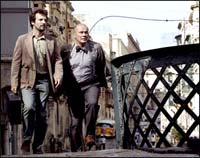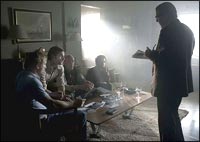 | « Back to article | Print this article |
 Gripping for much of its 160 minutes of harrowing depiction of terrorism followed by lethal acts of vengeance, Steven Spielberg's Munich is a disturbing thriller as well as a meditation on vengeance-for-vengeance politics.
Gripping for much of its 160 minutes of harrowing depiction of terrorism followed by lethal acts of vengeance, Steven Spielberg's Munich is a disturbing thriller as well as a meditation on vengeance-for-vengeance politics.
Though the film's sympathy firmly -- and not surprisingly -- lies with Israel, it is indeed interesting to hear the Palestinian viewpoint now and then in the film, directed by one of Hollywood's most famous Jews.
The film, based on factual incidents is the most violent of all Spielberg films. It was co-written by Jewish playwright Tony Kushner, who is also a socialist and secularist.
The massacre that inspired Spielberg
In showing how a committed secret killer for the government becomes a thorn to the State and how his life is threatened, even as some army officer congratulate him in private for killing seven alleged terrorists, the film reminds us of the finest works of the novelist John le Carre.
![]()
More on rediff.com!
![]()
![]()
![]()
![]()
Your favourite Salman movie?![]()
Ash: Up close & personal![]()
Abhishek beats dad abroad![]()
![]()
![]()
The film starts with the 1972 abduction and murder of 11 Israeli athletes at the Munich Olympic Games by Black September, a Palestinian underground faction. And it follows the subsequent hunting down and killing of seven people allegedly responsible for the massacre.
The film is a political minefield. Conservative Jews have already denounced it for having given room for a Palestinian viewpoint. But the movie will anger Palestinians too, since it shows only the Jewish killers -- three of a small team -- anguished over their mission, and gnawed by doubts and pessimism.
Some viewers may wonder whether there could have been the tiniest hesitation among the Palestinians as they went around killing the athletes.
 The war mongering neo-cons in Washington, who justify the Guantanamo Bay detention of suspected terrorists without trial and the acts of rendering suspects to countries known for their political torture, may find the film uncomfortable.
The war mongering neo-cons in Washington, who justify the Guantanamo Bay detention of suspected terrorists without trial and the acts of rendering suspects to countries known for their political torture, may find the film uncomfortable.
But they may also take solace from what the then Israeli prime minister Golda Meir (played by a terrific Lynn Cohen) told an ultra-secret Cabinet meeting while authorising the obliteration of the alleged terrorists: 'Every civilisation finds it necessary to negotiate compromises with its own values.'
Some viewers may be turned off by the film's criticism of the extra-constitutional role played by some members of the Israeli secret service Mossad in targeting the alleged terrorists. And some viewers may condemn the film claiming it still serves the Jewish and Israeli interest.
Some may find the theoretical discussions about nationalism, violence, and counter-violence too involved and a bit boring.
But the film, filled with atmospheric visuals, a mournful musical score and solid performances by a cast of French, British, Australian and Irish thespians -- with the newly anointed James Bond Daniel Craig playing a substantial role -- should not be missed.
Even those viewers who may know little about the highly convoluted world of Middle East politics or may not know much about the 1972 killings can watch the film as a morality drama that poses troubling questions. And those questions resonate with not only what happened in America after 9/11 but in various parts of the world where terrorist acts have led to revenge.
At the centre of the film's drama is Avner (Eric Bana, even more impressive than in Troy, with his anguished looks), who decides to leave behind his pregnant wife to lead the highly secretive assassination team.
 His doubts begin to devour him long after two of his colleagues start asking embarrassing and troubling questions.
His doubts begin to devour him long after two of his colleagues start asking embarrassing and troubling questions.
In the final reckoning, it is his haunted face and his confrontation with the Israeli spymaster (a riveting Geoffrey Rush) that we remember most.
As people who happened to be in the wrong place and at the wrong time are killed, it becomes obvious to the Israeli assassins that the killing has spread beyond the targets.
In one of the most dramatic scenes -- even though it certainly feels too manipulated -- a Palestinian young man is discussing with Avner (without knowing he is an Israeli) his own longing for a Palestinian State.
There is some poignancy here: The Israeli is missing his wife and the baby daughter who have migrated to America at his suggestion. And the Palestinian is dreaming of a home, a country that he never had.
As the body count mounts, the team leader is not sure anymore of the game plan. He wonders if he is being manipulated by the spymaster.
The film offers no clear solution, but just as it lets the young Palestinian articulate his fight for his homeland, it also has the team leader's mother, a Holocaust survivor, defending the creation of Israel.
But what it is clear about, and what it effectively conveys, is the Gandhian thought that an eye for an eye makes the whole world blind.